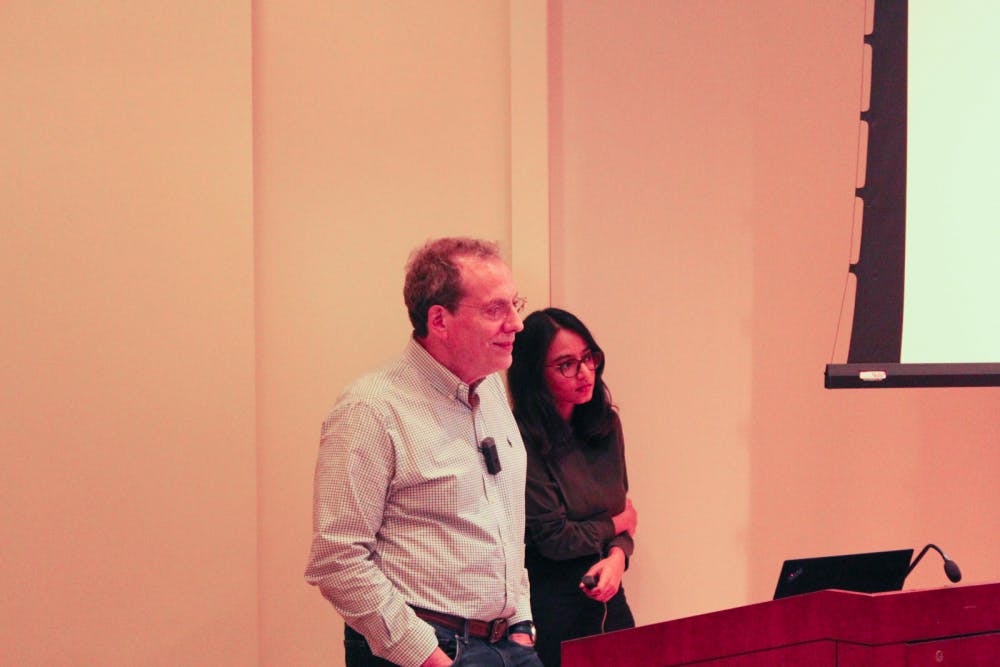Last Thursday evening in Mason Hall, students and faculty attended the second Conversations in Medicine seminar of this semester.
This event highlighted the research surrounding NASA’s Twins study which studied the lives of identical twins Scott and Mark Kelly. Scott Kelly spent a year in space while his twin, Mark, stayed on Earth.
Conversations in Medicine, also known as CiM, is a lecture series co-hosted by the Johns Hopkins Women’s Pre-Health Leadership Society (WPHLS) and Alpha Epsilon Delta (AED), two pre-professional organizations for students looking to pursue a career in health or medicine.
The CiM committee consists of a few designated executive board members from both pre-health societies, and every month CiM brings in health professionals who are experts in their respective fields to speak to undergraduate students.
CiM has been operating for four years at Hopkins, with the 2017-2018 school year marking the fifth.
Each year has a diffferent theme and this year’s is “Age of Ingenuity.”
The particular CiM event this past week was a lecture on Space Medicine by Dr. Andrew Feinberg, King Fahd professor of medicine, oncology, molecular biology and genetics at the Hopkins School of Medicine and principal investigator of NASA’s famous Twins Study.
The event was sponsored by the Hopkins Parents Fund and Space@Hopkins, the latter of which is a group focusing on exposing the student body to space-related activities, exploration and research efforts at Hopkins.
The was kicked off in the evening with the Space@Hopkins Social Hour, during which attendees from WPHLS, AED and Space@Hopkins mingled with other undergraduates, graduates, faculty and interested members of the community.
Feinberg then began the talk by describing his experience working at NASA and leading the Twins Study.
Through using powerful instruments in full-genome sequencing, the Twins Study aimed to provide valuable insight into the effects that spaceflight has on human genetic expression and its implications on personalized medicine.
Feinberg described the many obstacles space medicine research faces that scientists on the ground do not often need to consider.
For example Feinberg described the methods that he used for taking blood samples from the twins (or potentially other crew members who got sick) for molecular tests back on Earth.
“We had to go through elaborate procedures,” Feinberg said.
They would draw the blood, it was put it on a spacecraft, sent to Kazakhstan, then flown by jet to NASA in Houston where we could do the next steps.”
In order to solve this problem, he and his research team boarded a zero-gravity airplane to test the plausibility of running molecular biology experiments in a microgravity environment. They tested multiple pipetting methods and were delighted to find that just a simple micropipette produced very accurate results.
“It was just as easy, if not easier, to do pipetting in space as it is on the ground,” Feinberg said.
Next they arranged for certain molecular biology experiments to be conducted on the spacecraft, eliminating the need to always fly samples back and forth.
Feinberg also discussed studying the psychological and behavioral effects that long-term space travel and isolation have on people. Mental health has often been overlooked when selecting astronauts, but investigations have determined that it is essential in ensuring the safety of the crew and the success of the mission.
The lecture drew to a close, and audience members had opportunities to ask questions to the speakers.
Sophomore Michelle Chiu, CiM chair of WPHLS, said that organizing CiM every month is not an easy task.
“The hardest part is definitely figuring out who people would like to hear from,” Chiu said.
With the diverse interests of the Hopkins student body, Chiu and the rest of the leadership team try to make their CiMs informative and engaging for everyone.
Chiu also spoke about the challenging of accounting for the speakers’ availabilites, their willingness to take time out of their schedule and the logistics of organizing their trip to Hopkins.
Luckily, Chiu thinks that the benefits of holding these events far outweigh the challenges.
“Nothing beats seeing the event come together, when everyone has eaten and is sitting down and anticipating the beginning of the presentation,” Chiu said. “When I see people excited to learn or engaged and actively participating in discussion, I know we’ve managed to put together something that is interesting and applicable to them, and that’s just so rewarding.”
Chiu added that the goal of CiM is to expose the student body to different aspects of medicine, different areas of study and different ways of thinking.
According to Chiu, in the past, CiM has hosted a plethora of different guest speakers, including a medical patent lawyer, an artist who illustrates surgery incisions, an official in charge of law-enforcement medicine, a physician-author, a forensic specialist and now a professor in space medicine.
“All these different speakers come in to talk about what they’re passionate about,” Chiu said, “and I hope that after seeing how all of these respected experts have built their careers around their own interests in medicine, all in very unique ways, people will realize that you don’t have to be like everyone else to pursue what you love and be an impactful and successful health professional,” Chiu said.





